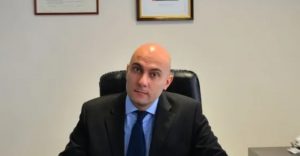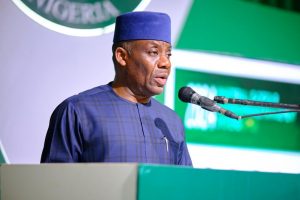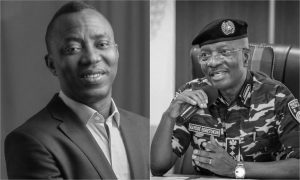Programme Manager (DDRR) at the International Organization for Migration (IOM)

The International Organization for Migration (IOM) – Established in 1951, IOM is the leading inter-governmental organization in the field of migration and works closely with governmental, intergovernmental and non-governmental partners. IOM is dedicated to promoting humane and orderly migration for the benefit of all. It does so by providing services and advice to governments and migrants.
We are recruiting to fill the position below:
Job Title: Programme Manager (Demobilization Disassociation Reintegration & Reconciliation (DDRR)
Location: Abuja, Nigeria
Classification: Professional Staff, Grade P4
Type of Appointment: Fixed term, one year with possibility of extension
Estimated Start Date: As soon as possible
Context
- The nine-year violent conflict across North-eastern and East Nigeria and bordering areas in Niger, Chad and Cameroon have created a deepening social, political, security and humanitarian crisis that has displaced approximately 2.6 million people and affected some 17 million. In response to request from Government of Nigeria, the International Organization for Migration (IOM) is supporting activities aimed at creating the necessary pre-conditions for the identification and reintegration of ‘low-risk’ Non-State Armed Groups detainees and defecting former fighters, reducing recruitment into armed groups and promoting broad reconciliation for sustained reintegration and peacebuilding.
- Working under the direct supervision of the Chief of Mission (CoM), and in close coordination with the Head, Transition and Recovery Division (TRD) at IOM Headquarters (HQs), and Emergency and Post Crisis (EPC) Regional Thematic Specialist (RTS) at the Regional Office for West and Central Africa (ROWCA), the successful candidate will be responsible for the overall management and coordination of the Demobilization, Disassociation, Reintegration and Reconciliation (DDRR) programme at IOM of Nigeria.
- S/he will provide overall guidance to IOM’s country-level DDRR activities with a particular focus on supporting a government-led process, including the development, implementation, monitoring and evaluation of respective national legal and policy frameworks, and supporting aspects such as registration and vetting processes, public outreach and communications, community-based reconciliation mechanisms to provide locally tailored reintegration assistance to individuals who have separated from Non-State Armed Groups, as a critical step for regional peace-building and restoration of social cohesion. S/he will convene multiple stakeholders across government, in the international community, and within the Organization to facilitate programme success.
Core Functions / Responsibilities
- Manage the implementation of DDRR programme operations at the country level and ensure the programmatic, financial, administrative and technical oversight of programme activities in line with IOM policies and procedures, as well as relevant donor requirements.
- Develop and oversee research components of the programme, including stakeholder mapping, assessments of the policy and legal environment, mapping of existing return and reintegration assistance models for disengaged combatants and conflict analyses; assess entry points for regional synergies and outcomes across programme elements.
- Working closely with the Chief of Mission and the TRD Advisor, to assess strategic opportunities within the programme framework, provide regular risk analysis, and develop a detailed work plan in accordance with the project commitments considering developments in context, donor coordination and commitments, and in support of government partnership.
- Support country level donor coordination and outreach in coordination with the Chief of Mission, TRD and relevant Divisions at HQs, to support programme development, donor information needs and coordination requirements.
- Ensure operational oversight across four key pillars of concurrent activity, building on regular context analysis and programme assessment, to include national policy and framework development; technical government capacities and transition processes; individual beneficiary profiling, needs and support (donor support pending); and community-based return, reintegration and reconciliation activities.
- Oversee the development of information and strategic communications activities, assessing synergies and partner efforts in this area; within the IOM programme, establish feedback mechanisms to inform adjustments in strategy and implementation.
- Train and sensitize staff on the principles of “Do No Harm” and ensure that conflict sensitivity is integrated in programme analysis, planning, recruitment, procurement, partnerships, communications and monitoring and evaluation.
- Promote access to facilitate programme activities and undertake regular field travel and on-site monitoring; oversee implementation of programme impact evaluations, as required.
- Represent IOM at relevant seminars, meetings, and other events to promote awareness of key DDRR initiatives, conflict reduction and prevention of violent extremism and disseminate stakeholder views of context analysis, initiatives and the results of broad partnership initiatives.
- Maintain regular outreach to all counterparts including UN and national authorities while participating in and ensuring regular donor coordination updates and reporting, both locally and regionally.
- In close coordination with the Chief of Mission and Resource Management Officer, plan and oversee the implementation of core staffing plans and requirements; work in close coordination with HQs/TRD on the deployment of technical expertise and consultancies.
- Direct, supervise and train DDRR programme staff.
- Provide regular updates and recommendations for operational improvements to the CoM, RTS and TRD.
- Uphold security procedures and requirements towards ensuring the safety and integrity of programme staff and operations.
- Perform such other duties as may be assigned.
Required Qualifications and Experience
Education:
- Master’s degree in Law, International Relations, Development Studies, Planning or a related field from an accredited academic institution with seven years of relevant professional experience; or
- University degree in the above fields with nine years of relevant professional experience.
Experience:
- Professional experience at an international level with specialized international agencies (United Nations Agencies, International Organizations, and International Non-Government Organizations) would be an advantage; experience in complex crisis operations, including conflict and post-conflict situations required, delivering on programmatic objectives;
- Operational field experience in programme formulation, implementation and evaluation relating to demobilization/disengagement and reintegration of ex-combatants;
- Experience facilitating government-led processes, involving multiple government actors and demonstrating sensitivity to the needs of local ownership;
- Previous work experience in technical programmes involving legal or policy formulation, community-led recovery and stabilization programmes, and or security sector related reforms. Familiarity with DDR practices, principles and operations, and/or conflict mitigation components; recent field or research experience on the prevention of violent extremism an advantage;
- Previous experience in supervising staff;
- Thorough knowledge of the United Nations Department of Safety and Security protocols and experience managing staff in volatile security environments; and,
- Experience in setting clear tasks and team-building with staff from diverse environments and backgrounds.
Languages:
- IOM’s official languages are English, French and Spanish.
- For this position, fluency in English is required (oral and written). Working knowledge of French and/or Spanish is an advantage.
- Accredited Universities are the ones listed in the UNESCO World Higher Education Database (https://whed.net/home.php).
Required Competencies
Values – all IOM staff members must abide by and demonstrate these three values:
- Inclusion and respect for diversity: respects and promotes individual and cultural differences; encourages diversity and inclusion wherever possible.
- Integrity and transparency: maintains high ethical standards and acts in a manner consistent with organizational principles/rules and standards of conduct.
- Professionalism: demonstrates ability to work in a composed, competent and committed manner and exercises careful judgment in meeting day-to-day challenges.
Core Competencies – behavioural indicators level 3:
- Teamwork: develops and promotes effective collaboration within and across units to achieve shared goals and optimize results.
- Delivering results: produces and delivers quality results in a service-oriented and timely manner; is action oriented and committed to achieving agreed outcomes.
- Managing and sharing knowledge: continuously seeks to learn, share knowledge and innovate.
- Accountability: takes ownership for achieving the Organization’s priorities and assumes responsibility for own action and delegated work. Communication: encourages and contributes to clear and open communication; explains complex matters in an informative, inspiring and motivational way.
Managerial Competencies – behavioural indicators level 3:
- Leadership: provides a clear sense of direction, leads by example and demonstrates the ability to carry out the organization’s vision; assists others to realize and develop their potential.
- Empowering others & building trust: creates an atmosphere of trust and an enabling environment where staff can contribute their best and develop their potential.
- Strategic thinking and vision: works strategically to realize the Organization’s goals and communicates a clear strategic direction.
IOM’s competency framework can be found at: https://www.iom.int/sites/default/files/about-iom/iom_revised_competency_framework_external.pdf
Competencies will be assessed during a competency-based interview.
Other:
- Internationally recruited professional staff are required to be mobile.
- Any offer made to the candidate in relation to this vacancy notice is subject to funding confirmation.
- The list of NMS countries above includes all IOM Member States which are non-represented in the Professional Category of staff members. For this staff category, candidates who are nationals of the duty station’s country cannot be considered eligible.
- Appointment will be subject to certification that the candidate is medically fit for appointment, accreditation, any residency or visa requirements, and security clearances.
Application Closing Date
11th July, 2019.
The post Programme Manager (DDRR) at the International Organization for Migration (IOM) appeared first on Jobs in Nigeria – http://jobsinnigeria.careers.







